Do I Qualify For The Social Media Mental Health Lawsuit?
- Last Updated: July 14th, 2025

Attorney Jessie Paluch, founder of TruLaw, has over 25 years of experience as a personal injury and mass tort attorney, and previously worked as an international tax attorney at Deloitte. Jessie collaborates with attorneys nationwide — enabling her to share reliable, up-to-date legal information with our readers.
Legally Reviewed
This article has been written and reviewed for legal accuracy and clarity by the team of writers and legal experts at TruLawsuit Info and is as accurate as possible. This content should not be taken as legal advice from an attorney. If you would like to learn more about our owner and experienced injury lawyer, Jessie Paluch, you can do so here.
Fact-Checked
TruLawsuit Info does everything possible to make sure the information in this article is up to date and accurate. If you need specific legal advice about your case, contact our team by using the chat on the bottom of this page. This article should not be taken as advice from an attorney.
Key Takeaways:
- To be eligible for the Social Media Mental Health Lawsuit, individuals must show a direct link between their social media use and mental health issues such as anxiety or depression.
- Compensation in these lawsuits can cover medical costs, emotional distress, physical health effects related to mental well-being, punitive damages for intentional harm by companies, and loss of enjoyment in life due to social media's negative impact.
- Legal actions like this aim not only at financial compensation but also at holding social media platforms accountable and encouraging changes to protect users' mental health.
Do I Qualify For The Social Media Mental Health Lawsuit?
On this page, we’ll provide an overview of the Social Media Mental Health Lawsuit, recognizing signs of social media addiction, recent studies on the impacts of excessive social media use, and much more.
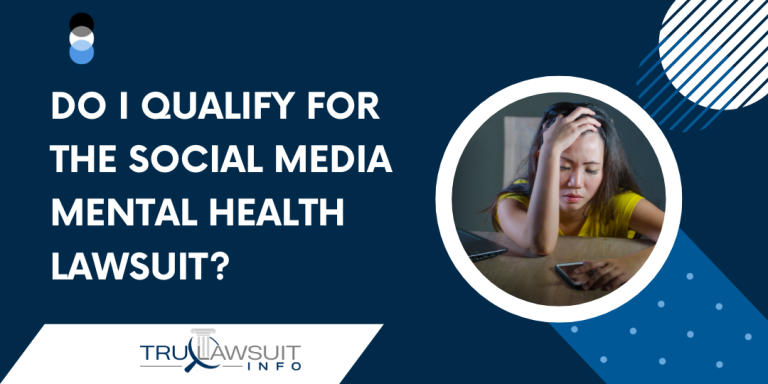
Intro to The Social Media Mental Health Lawsuit
Individuals seeking compensation in Social Media Harm Lawsuits have experienced various forms of harm, including but not limited to:
- Attempted Suicide
- Self-harm
- Clinical Depression
- Social Media Addiction
- Severe Anxiety Disorders
- Eating Disorders
- Other life-altering forms of psychological and physical harm.
If you or a loved one are experiencing mental health issues due to excessive social media use, you may be eligible to file a claim.
Contact TruLaw using the chat on this page to receive an instant case evaluation.
Table of Contents
What is Social Media Mental Health Lawsuit?
The social media mental health lawsuit seeks to address the negative impacts of online platforms on young people’s mental and emotional health.
The design and addictive nature of social media platforms are key elements in these lawsuits.
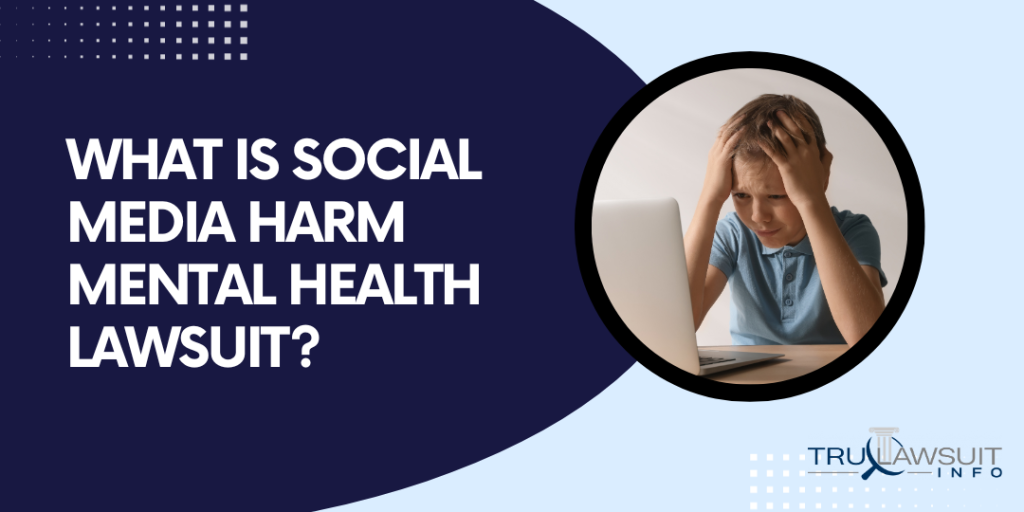
Here are some key takeaways about the social media mental health lawsuit:
- The lawsuits point to the addictive design of these platforms, which allegedly contribute to a youth mental health crisis.
- Major social media companies like Meta, ByteDance, Alphabet, and Snap are facing these lawsuits.
- There’s a claim that these companies have engineered their algorithms to generate addictive content.
Developing A Social Media Addiction
Plaintiffs argue that the companies deliberately design their platforms to be addictive, leading to increased usage and subsequent mental health issues among users.
Key points in understanding social media addiction include, but are not limited to:
- The companies are alleged to have engineered their algorithms to generate addictive content.
- This addictive design is seen as contributing to a youth mental health crisis.
- The addictive nature of these platforms is also seen to result in a range of mental health problems, such as depression and anxiety.
Companies Involved
Several major social media companies are involved in these lawsuits. They are accused of harming children through the design and operation of their platforms.
Here are the companies currently facing these lawsuits:
- Meta, the company behind Facebook and Instagram, is a significant target of these lawsuits.
- ByteDance, the company behind TikTok, is also involved in the lawsuit.
- Other companies named in the lawsuits include Alphabet, the parent company of Google and YouTube, and Snap, the company behind Snapchat.
Implications of the Social Media Mental Health Lawsuit
The implications of the social media mental health lawsuit could lead to significant changes in how platforms operate and engage with users.
Potential implications of the social media mental health lawsuit include, but are not limited to:
- They could result in significant changes to the design and operation of social media platforms.
- They could potentially lead to better protection of young users from harmful content and addictive designs.
- They could set a precedent for future lawsuits against social media companies, potentially leading to further action against harmful platform practices.
Steps to File a Social Media Mental Health Lawsuit
The legal process to file a social media mental health lawsuit involves a series of important steps to hold social media companies accountable for their harmful actions and behavior.
It is important to provide extensive details and documentation regarding mental health issues experienced after the excessive use of social media to support your mental health claim.
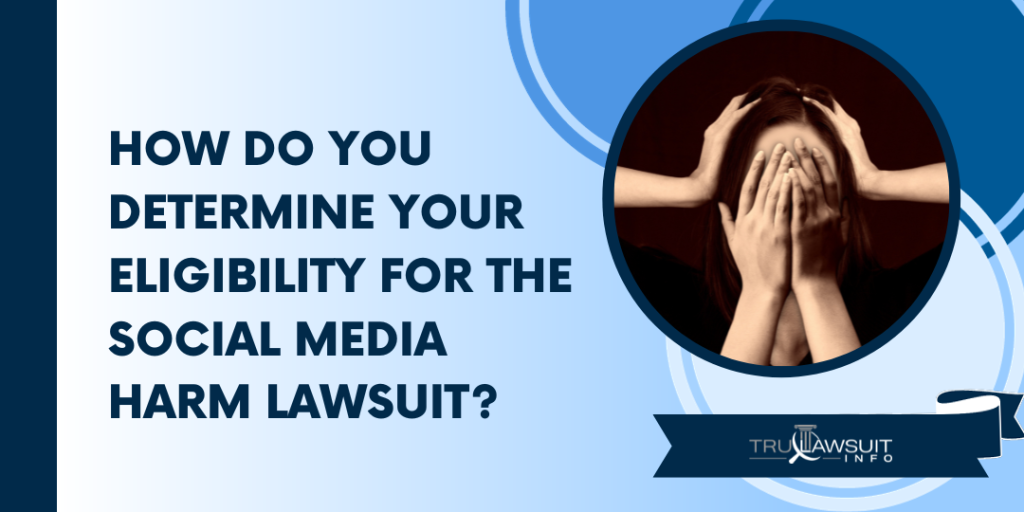
1.) Discuss The Basis of Your Social Media Claim
Before filing a lawsuit, it is important to understand the legal basis for your claim.
This involves understanding the legal standards that apply to social media companies and the potential for holding them accountable for mental health issues caused by the use of their platforms.
Important details to discuss related to the basis of your social media claims include, but are not limited to:
- Identifying potential legal theories: Different legal theories may be applicable depending on the jurisdiction. These could include negligence, infliction of emotional distress, or violation of consumer protection laws.
- Understanding the duty of care: Social media companies may have a duty of care to their users, which includes taking reasonable steps to prevent foreseeable harm.
- Evaluating potential defenses: Social media companies may claim that they are not responsible for user-generated content, citing protections under laws such as Section 230 of the Communications Decency Act.
2.) Compile All Available Documentation & Evidence
Collecting evidence is a crucial step in filing a Social Media Mental Health Lawsuit.
The value of your settlement will be contingent upon supporting your claim with patterns of mental health issues or hospitalizations.
Critical aspects to consider when gathering evidence include:
- Documenting the harm: This may involve medical records, therapy notes, and other evidence of mental distress.
- Tracking usage: Evidence of extensive use of the social media platform, as well as any changes in behavior or mental health following this use, can be crucial.
- Collecting communications: Any communications with the social media company regarding mental health issues, such as requests for help or complaints, can strengthen the lawsuit.
3.) Seek Professional Legal Assistance
After consulting with medical professionals, it is highly recommended to seek professional legal assistance immediately.
An experienced social media lawyer at TruLaw can guide you through the legal process and ensure that your rights are protected.
When seeking legal assistance, remember to:
- Choose a lawyer with experience in this field: TruLaw can help you understand the legal issues involved and identify the best strategies for your case.
- Prepare for the legal process: This includes understanding the potential timeline of the litigation as well as preparing emotionally for the potential challenges ahead.
If you or a loved one are experiencing mental health issues due to excessive social media use, contact TruLaw using the chat on this page to receive an instant case evaluation.
What Are the Eligibility Requirements for the Social Media Mental Health Lawsuit?
Question: Who is eligible to file a Social Media Mental Health Lawsuit?
Answer: Eligibility to file a social media mental health lawsuit typically includes those who spend more than 3 hours per day on social media platforms such as TikTok, Instagram, Facebook, YouTube, or Snapchat.
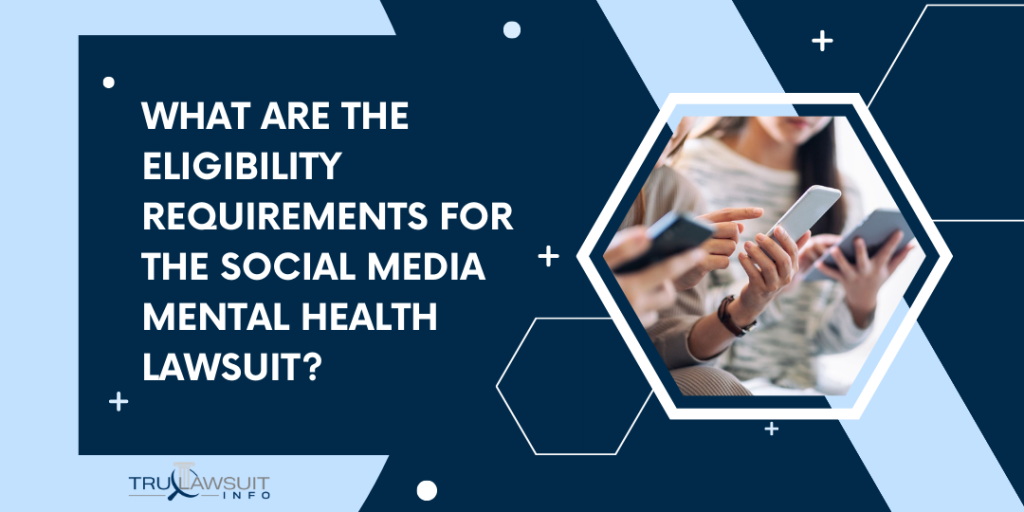
To participate, individuals must meet specific eligibility criteria tied to their social media use and subsequent mental health issues:
- There is a clear link between social media consumption and the onset or worsening of mental health problems.
- Evidence shows that excessive use of social media sites significantly contributes to these issues.
- Diagnosed psychiatric disorders such as depression, anxiety, or other conditions can be correlated with social media habits.
- Experiences of online abuse or harassment that have led to psychological trauma or low self-esteem in the claimant.
- Life satisfaction or subjective well-being decreases following increased time spent on these platforms.
- Representing adolescent health concerns, especially if there are claims of negative effects stemming from targeted advertising on youth mental health.
- A history of seeking professional help for emotional support due to difficulties related to online interactions.
- Documentation showing prolonged exposure to harmful content on different platforms has harmed the claimant’s psychological well-being.
- Legal guardians filing on behalf of family members must demonstrate how social media use has directly affected their child’s mental state.
Mental Health Issues: Teens & Young Adults
Individuals who have suffered mental health problems as a result of social media usage may qualify to participate in a social media harm lawsuit.
This includes those experiencing depression, anxiety, body dysmorphia, and similar issues linked to social media addiction.
This category may include the following sub-requirements:
- Documented evidence of mental health issues
- A clear link between social media usage and the onset or exacerbation of these issues
- Damages or harm suffered as a result of these issues
The severity and impact of mental health problems have a significant impact on determining the eligibility of your claim.
Parents of Teens Experiencing Social Media Issues
Parents or guardians who can demonstrate that a teen’s mental health problems are significantly linked to their social media usage may also be eligible to file a lawsuit.
These cases commonly involve evidence of the teen’s social media usage patterns, mental health records, and expert testimony linking the two.
This category includes the following sub-requirements:
- Evidence of the teen’s excessive social media usage
- Medical records indicating mental health problems
- Expert testimony or studies linking social media usage to mental health problems in teens
Survivors of Teen Suicide Linked to Social Media Mental Health Issues
In tragic cases where a teen has taken their own life, and there’s evidence that social media usage played a significant role in their mental health decline, parents may be eligible to file a lawsuit.
These cases typically require extensive documentation and expert testimony.
This category includes the following sub-requirements:
- Evidence of the teen’s social media usage and mental health struggles
- Correlation between the timing of increased social media usage and the onset of severe mental health problems
- Expert testimony tying social media usage to the teen’s mental health decline and tragic end
Qualifying For The Social Media Mental Health Lawsuit
Those eligible for the social media mental health lawsuit are primarily teens and young adults who can demonstrate that their use of social media platforms has significantly harmed their mental health.
Parents or guardians may also be eligible to file on behalf of their child, specific eligibility requirements can vary.
Consult an experienced social media attorney at TruLaw using the chat on this page to see if you’re eligible to file a claim today.
What Types of Compensation Are Available in the Social Media Harm Mental Health Lawsuit?
Recognizing the impact of social media on mental health is crucial when considering compensation for harm caused.
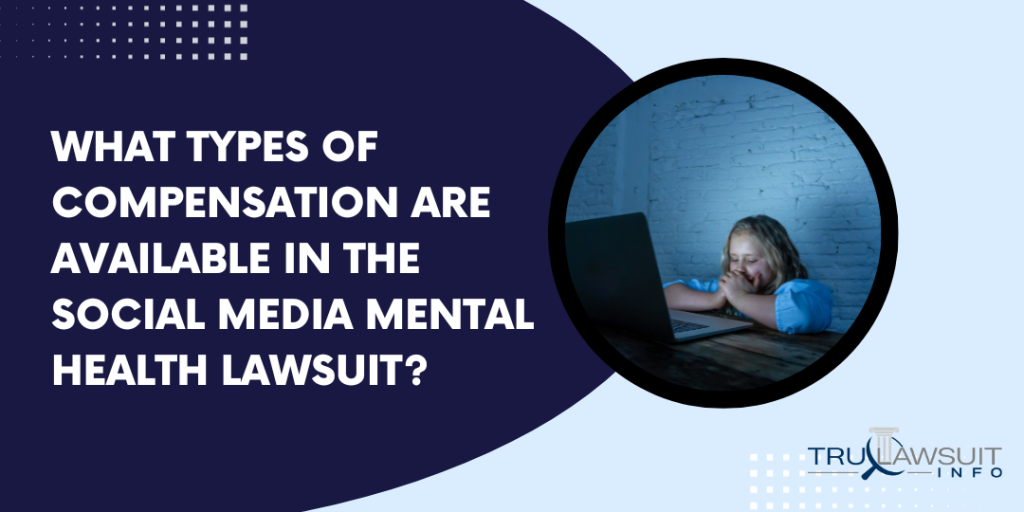
Here are the types of compensation available in the social media mental health lawsuit:
- Financial Compensation: This includes reimbursement for medical expenses, therapy costs, and any other financial losses incurred due to mental health issues caused by social media.
- Emotional Damages: Compensation may cover the emotional trauma, distress, and psychological suffering experienced as a result of harm to mental well-being caused by social media platforms.
- Physical Repercussions: In cases where mental health issues have led to physical manifestations or exacerbation of pre-existing physical conditions, compensation can be sought for these damages, too.
- Punitive Damages: Designed to punish the responsible party, punitive damages serve as a deterrent and may be awarded if the conduct contributing to mental health harm was particularly egregious or intentional.
- Loss of Enjoyment: Individuals impacted by diminished quality of life and inability to enjoy activities they once did due to social media-related mental health problems can seek compensation for this loss.
How Do You Get Legal Help For Social Media Harm?
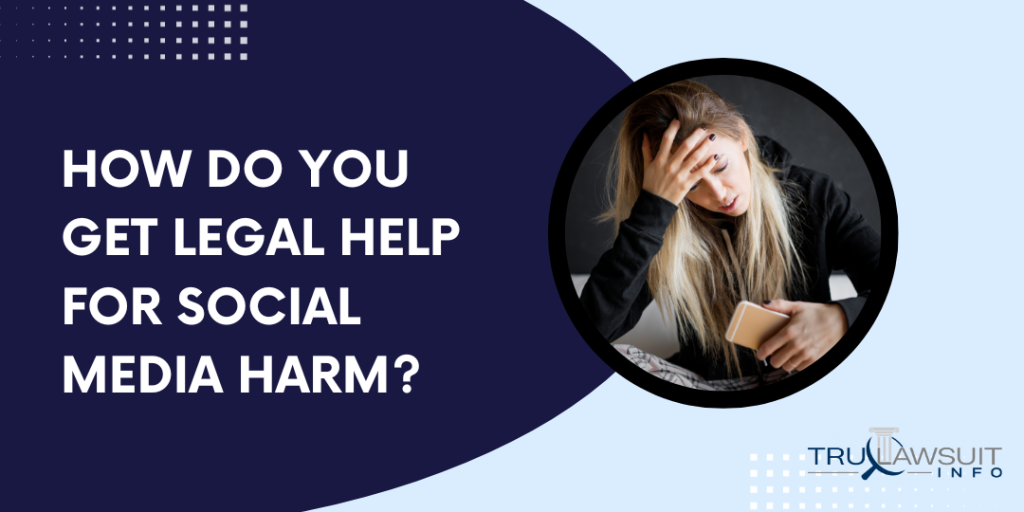
For guidance in the social media mental health lawsuit, consider the following steps:
- Research attorneys with expertise in social media harm lawsuits and mental health litigation.
- Schedule a consultation with a qualified attorney to discuss your situation and determine the viability of your case.
- Prepare relevant evidence, such as documentation of mental health issues and the impact of social media on your well-being.
- Seek recommendations from trusted sources or professional organizations for reputable legal representation.
- Review the attorney’s track record in handling similar cases and their success rate in securing client compensation.
- Gather information about potential costs, including legal fees and any associated expenses for pursuing the lawsuit.
- Understand the legal process involved in filing a social media harm mental health lawsuit and the expected timeline for resolution.
Consider the emotional support available through legal representation, ensuring your well-being is prioritized throughout the process.
Conclusion
In conclusion, understanding your eligibility for the Social Media Mental Health Lawsuit is crucial for seeking recourse.
Recognizing social media’s effects on youth mental health can help you assess whether you meet the eligibility requirements.
Consulting an attorney is important to navigate the complexities and pursue potential compensation efficiently.
Embracing this actionable guidance can lead to significant improvements in addressing mental health problems linked to social media use.
Highlighting practical strategies and emphasizing their importance will raise awareness and empower individuals affected by these issues as they seek justice and support.
It’s time to stand against social media harm and protect our mental well-being.
Frequently Asked Questions
-
What Is The Social Media Harm Mental Health Lawsuit About?
The social media mental health lawsuit raises awareness of how a social media addiction can double the risk of harming mental well-being, including self-esteem and psychological health.
-
How Does Spending Time On Social Media Affect My Well-Being?
Recent research suggests that online social interactions through platforms like Facebook may increase feelings of low self-esteem and predict declines in subjective well-being.
-
Can Using Social Media Increase My Chances Of Developing Mental Health Issues?
Yes, studies have shown an increased risk for mental health problems such as social anxiety and lower self-esteem, particularly when people tend to spend much time or share a lot online.
-
How Does Spending Time On Social Media Affect My Well-Being?
The focus is more on excessive social phone use and sharing online media, which might need to be sufficiently safe for everyone’s public health, according to the Surgeon General’s warnings.
-
Who Can Join The Social Media Mental Health Lawsuit?
Individuals who’ve experienced negative effects on their real-life personality traits or fewer friends due to excessive and harmful usage could potentially qualify to join the social media mental health lawsuit.

Experienced Attorney & Legal SaaS CEO
With over 25 years of legal experience, Jessie is an Illinois lawyer, a CPA, and a mother of three. She spent the first decade of her career working as an international tax attorney at Deloitte.
In 2009, Jessie co-founded her own law firm with her husband – which has scaled to over 30 employees since its conception.
In 2016, Jessie founded TruLaw, which allows her to collaborate with attorneys and legal experts across the United States on a daily basis. This hypervaluable network of experts is what enables her to share reliable legal information with her readers!
Have A Case?
Here, at Tru Lawsuit Info, we’re committed to helping victims get the justice they deserve.
To do this, we actively work to connect them with attorneys who are experts in litigating cases similar to theirs.
Would you like our help?
Tru Lawsuit Info is a reliable source of information about issues that may affect your health and safety, such as faulty products, data breaches, and environmental hazards.
Our team of experienced writers collaborates with medical professionals, lawyers, and advocates to produce informative articles, guides, and other resources that raise awareness of these topics.
Our thorough research provides consumers with access to reliable information and updates on lawsuits happening around the country. We also can connect consumers with attorneys if they need assistance.
Camp Lejeune's water contamination issue spanned several decades starting in the 1950s. Exposure to these chemicals has been linked to various serious health issues, including cancer, organ diseases, and death.
Research is increasingly suggesting a link between the use of Tylenol during pregnancy and the development of neurodevelopmental disorders, such as autism and ADHD, in infants.
Legal action is being taken against manufacturers of Aqueous Film-Forming Foam (AFFF), a chemical used in fighting fires. The plaintiffs allege that exposure to the foam caused health issues such as cancer, organ damage, and birth and fertility issues.
Have A Case?
Here, at Tru Lawsuit Info, we’re committed to helping victims get the justice they deserve.
To do this, we actively work to connect them with attorneys who are experts in litigating cases similar to theirs.
Would you like our help?







